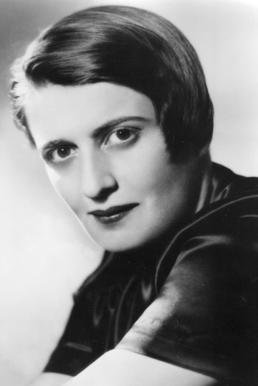
["Ayn Rand," by Talbot, taken from Wikipedia.Com; this image is used in accordance with fair use.]
Reposting from Quora
Ayn Rand had a few different sins, depending on the level of analysis.
She was a brilliant novelist and philosopher. Her "Introduction to Objectivist Epistemology" was arguably her greatest purely philosophical project. In my opinion, it is about on the level of Descartes' Meditations. Her work is somewhat similar to Hannah Arendt's, but it is more overtly classically liberal and pro-capitalist, and she doesn't have the same Heideggerian influences. She is reviled by academics and social conservatives. Some of their critiques of her are valid, although, for the most part, their critiques merely reveal their respective biases.
As far as her genuine shortcomings are concerned (in my opinion): there are two major ones that are related to her work, and two others that have more to do with her personal life.
In her work, her biggest shortcoming is that she doesn't acknowledge the debt she owes to other philosophers; especially Friedrich Nietzsche and Rene Descartes. Her metaphysics and epistemology owe a massive debt to Descartes, and her ethics owes a massive debt to Nietzsche. She does not acknowledge this, and tears down their respective bodies of work in her writings in a way that does not do them justice. This, I think, is reflective of the fact that she tends to adopt an extremely dismissive attitude towards most other major philosophers (which accounts for the valid aspects of academics' hatred of her). The second problem with her work is her failure to fully flesh out her answer to the free will problem, and the mind-body problem. Beyond those two issues, her philosophy is well thought out and consistent, albeit devoid of proper acknowledgment of her reliance on the contributions of past thinkers.
As for her personal life, she tended to alienate rather than build bridges, and her very public love life attracted a lot of criticism (perhaps some warranted, and perhaps some not) from social conservatives.
Ayn Rand was educated in the Soviet Union and she ended up rejecting the ideology that she encountered in school.
People who reject their schooling tend to develop a contrarian style.
So, while she clearly was influenced by Nietzsche, I suspect you would find a strong distaste for Nietzsche's style of nilhilism.
When Ayn Rand came to the United States, she found American intellectuals mired in the same rubbish as she saw in Leningrad.
Her effort to create Objectivism from the ground up as a new ideology shows that she saw something extremely toxic in modern discourse and felt that the best approach was to start over.
Downvoting a post can decrease pending rewards and make it less visible. Common reasons:
Submit
"Ayn Rand was educated in the Soviet Union and she ended up rejecting the ideology that she encountered in school.
People who reject their schooling tend to develop a contrarian style."
Yes.
"So, while she clearly was influenced by Nietzsche, I suspect you would find a strong distaste for Nietzsche's style of nilhilism."
Nietzsche wasn't a nihilist. He was pointing out that nihilism is a predictable result of the death of Medieval Christian values. His work was mostly concerned with addressing the problem of nihilism by the individual search for true, overcoming virtue. Rand's main critique of Nietzsche was that he proposed that because values have to be created by individuals (which is an idea that much of her work grew out of), he did not propose an objective morality of any kind (which she did - based on egoism). While Rand proposes an objective morality and Nietzsche doesn't, Rand's underlying premises rely heavily on Nietzsche's work.
"When Ayn Rand came to the United States, she found American intellectuals mired in the same rubbish as she saw in Leningrad."
Yes. She even portrays in one of her plays how American "liberal" intellectuals were actually aiding and abetting the communists directly, which was utterly horrifying to her.
"Her effort to create Objectivism from the ground up as a new ideology shows that she saw something extremely toxic in modern discourse and felt that the best approach was to start over."
Yes. Which, in and of itself, is a very Cartesian impulse. Descarte's project made her project possible in a lot of ways.
Downvoting a post can decrease pending rewards and make it less visible. Common reasons:
Submit
The connection between Nietzsche and Rand is interesting.
Personally, I see Nietzsche as a ranting narcissist like Joseph Smith. Both were in love with their ideas and both managed to form a cult following.
It is interesting that Nietzsche saw himself as anti-authoritarian and his rantings became a favorite read of the National Socialists who saw themselves as Nietzsche uber-men driving by the will to power to become the worst authoritarians in history.
Youtube has a video where Rand claims that Objectivism is a fundamental rejection of Nietzsche and Schopenhauer.
Ayn Rand seems to face the problem of all philosophies in that reactionary philosophies always end up bearing an imprint of the thing the philosopher is reacting against.
Downvoting a post can decrease pending rewards and make it less visible. Common reasons:
Submit